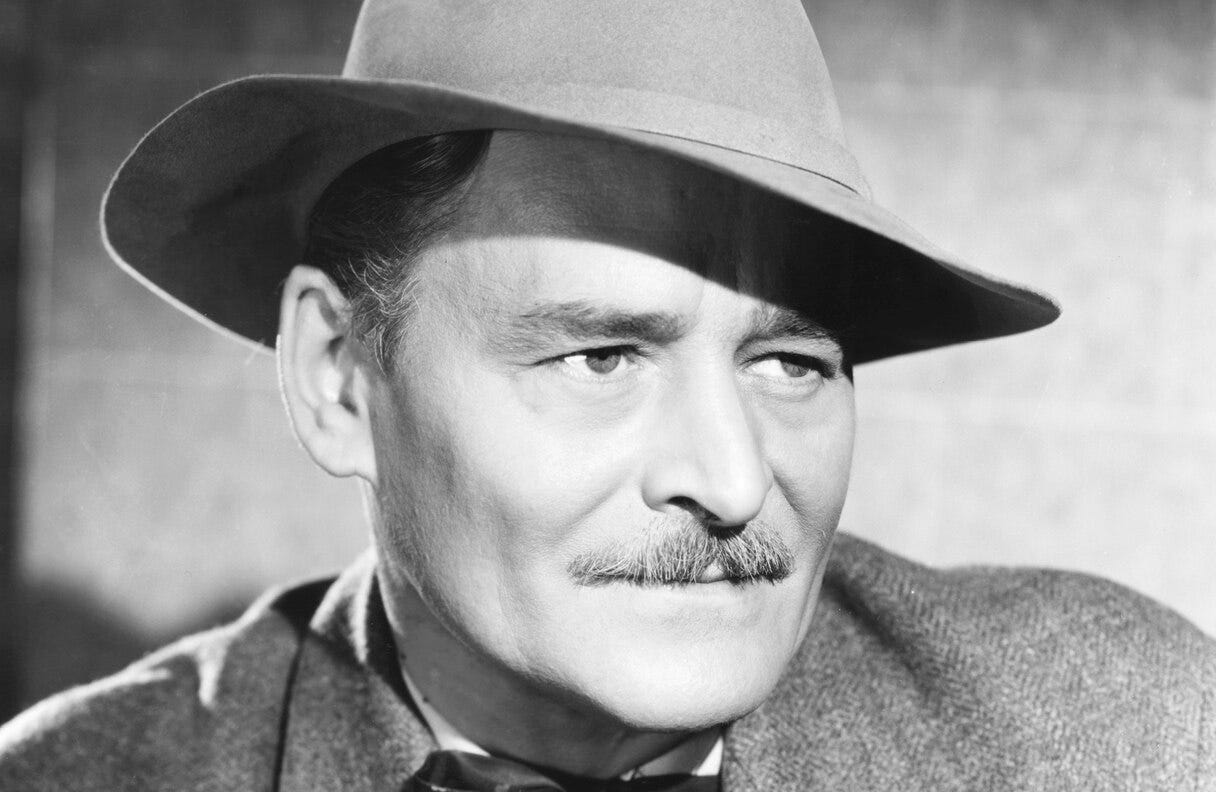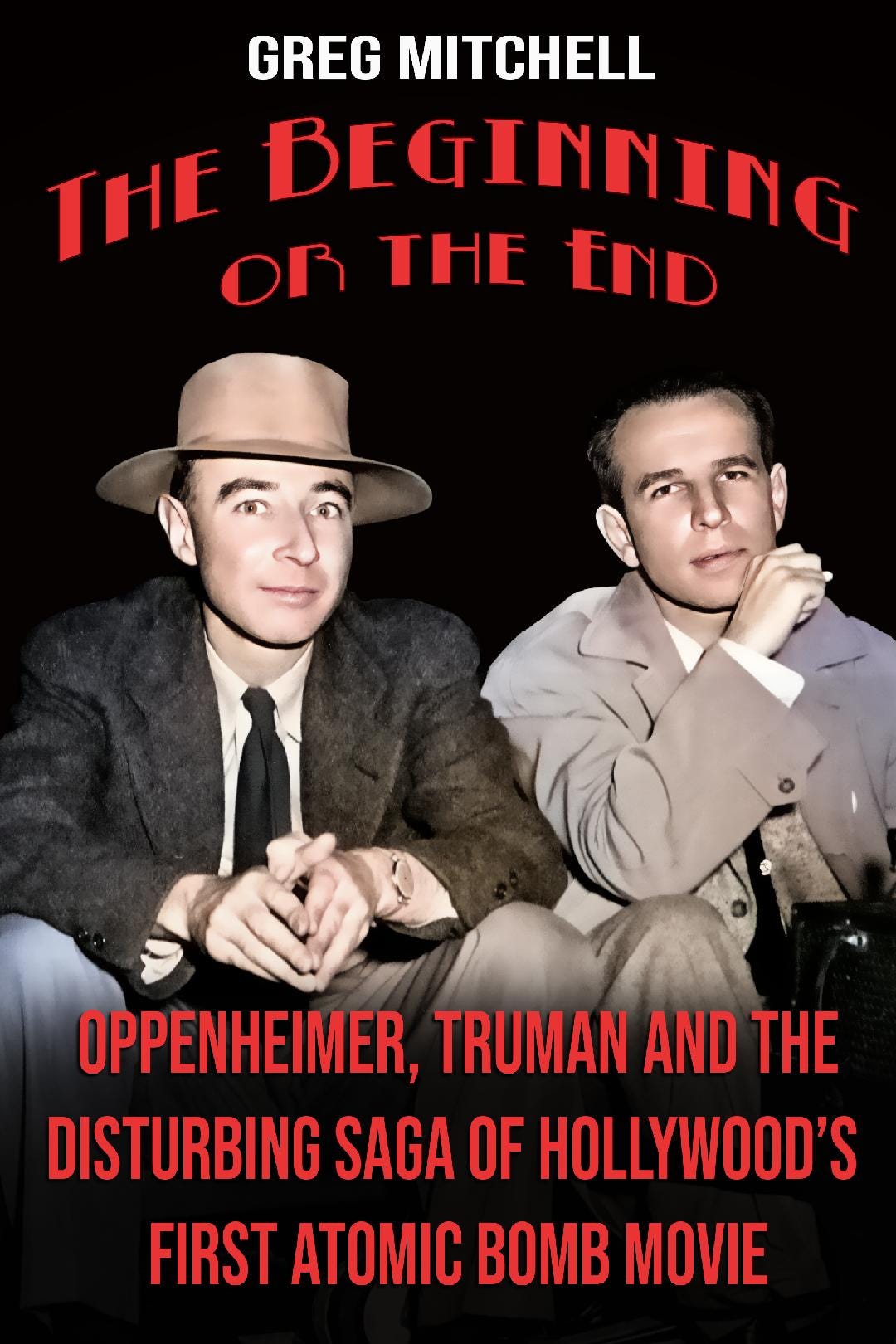Reprinted with permission from Greg Mitchell’s newsletter Oppenheimer: From Hiroshima to Hollywood.
A bizarre, yet revealing, postscript to President Truman re-writing of the first movie about the atomic bomb, from MGM, The Beginning or the End – covered here yesterday – was provided by Roman “Bud” Bohnen, the actor who portrayed the president in the original sequences. Bohnen, a 45-year-old character actor, had appeared in such well-known movies as Of Mice and Men, The Song of Bernadette, and A Bell for Adano (based on the John Hersey novel). He was also, perhaps more to the point, a former member of the very left-wing Group Theatre.
Learning of the need for a re-take following the White House critiques, Bohnen (see photo below) on December 2 wrote the President a polite, but slyly critical letter. He noted the President’s concerns about the depiction of his decision to “send the atom bomb thundering into this troubled world,” adding that he could “well imagine the emotional torture you must have experienced in giving that fateful order, torture not only then, but now – perhaps even more so.” So he could “understand your wish that the scene be re-filmed in order to do fuller justice to your anguished deliberation in that historic moment.”
Then he offered a suggestion. People would be talking about his decision for a hundred years, he observed, “and posterity is quite apt to be a little rough” on Truman “for not having ordered that very first atomic bomb to be dropped outside of Hiroshima with other bombs poised to follow, but praise God never to be used.” His idea: Truman should play himself in the film! If he believed in his decision so strongly why not re-enact it himself?
“If I were in your difficult position,” Bohnen wrote, “I would insist on so doing. Unprecedented, yes – but so is the entire circumstance, including the unholy power of that monopoly weapon.” Perhaps to show that he was semi-serious about all this, Bohnen sent a copy of the letter to MGM chief Louis B. Mayer.

Ten days later, Truman responded warmly, apparently missing (or ignoring) Bohnen’s sarcasm. He thanked the actor for his suggestion that he play himself but admitted that he didn’t have “the talent to be a movie star” and expressed confidence that Bohnen would do him justice.
Truman then took time to defend in some detail the decision to use the bomb, revealing much more about his emotional attitude than he usually did. He explained that what he had objected to in the film was that it pictured his decision as a “snap judgment,” while in reality “it was anything but that.” After the weapon was tested, and the Japanese given “ample warning,” the bomb was used against two cities “devoted almost exclusively to the manufacturer of ammunition and weapons of destruction.” This, of course, was a complete lie.
He added, “I have no qualms about it whatever for the simple reason that it was believed the dropping of not more than two of these bombs would bring the war to a close. The Japanese in their conduct of the war had been vicious and cruel savages and I came to the conclusion that if two hundred and fifty thousand young Americans could be saved from slaughter the bomb should be dropped, and it was.
“As I said before,” Truman concluded, “the only objection to the film was that I was made to appear as if no consideration had been given to the effects of the result of dropping the bomb – that is an absolutely wrong impression.” There is nothing on the historical record, or in Truman’s letters and diaries, however, to indicate that he did give strong consideration to the human toll in the Japanese cities, the release of radiation – or letting the nuclear genie out of the bottle.
So Truman refused to play himself in the film, but Bohnen also lost the opportunity. MGM suddenly replaced Bohnen in the re-takes with a slightly younger actor, who was instructed to portray Truman with more of a “military bearing” (revealing in itself). Did Truman or someone at the White House demand that Bohnen be replaced after learning about his political background, lack of “military bearing” or after reading his note to Truman? In any event, The New York Times reported that Bohnen had been replaced “at the suggestion of” the White House.
When The Beginning or the End was finally readied for release, the actor playing the President in the pivotal scene was Art Baker, who portrays the peppy, salt-of-the-earth Truman as magisterial and aristocratic: in other words, as a worthy successor to Franklin Roosevelt. (For much more on the movie, see my book.)
Baker, who had recently played a detective in Alfred Hitchcock’s Spellbound, wrote to Charlie Ross, revealing that he’d been picked to impersonate the president in the re-take – and expressing warm feelings for Truman. Ross replied six days later, in a note marked “Personal and Confidential,” inviting Baker to Washington, and informed him: “I suppose you know that the first sequence on President Truman was, as we thought here, pretty bad because it gave the impression that he made a snap decision to drop the bomb on Hiroshima. The new scene puts over the idea – the true idea – that this decision was only taken after the most prayerful decision and upon the advice of all his leading military advisers.” For expressing this on celluloid, Ross said he was “personally indebted” to Baker.
In reality, as Truman revealed in his memoirs, he regarded the bomb as a military weapon and “never had any doubt that it should be used.” So much for “prayerful” meditation.
 And Truman wasn’t the only famous American to get an actor fired from the MGM film.
And Truman wasn’t the only famous American to get an actor fired from the MGM film.
When Eleanor Roosevelt, still very much in the public eye as chairperson of the new U.N. Commission on Human Rights – and for her syndicated newspaper column, “My Day” – learned that the studio planned to cast Lionel Barrymore (above left) as her late husband she was not pleased.
The fact that Barrymore was confined to a wheelchair in real life did not impress her because she recalled that the actor had made several disparaging remarks about FDR (he was particularly incensed about Roosevelt promoting the graduated income tax). He campaigned for Thomas Dewey against FDR in 1944. As chairman of the Hollywood for Dewey organization he helped organize the biggest Republican rally in memory, with 93,000 filling the Los Angeles Coliseum for an extravaganza produced by director Cecil B. DeMille. Earlier that day the honored guests attended a luncheon staged by David O. Selznick with the chance to shake hands with Barrymore, Ginger Rogers, and Gary Cooper, among other stars. It was well known in Hollywood that Barrymore “hated Roosevelt,” as Lauren Bacall once put it.
Since the scenes with Roosevelt had not yet been shot, MGM put them on hold while Barrymore wrote a conciliatory letter to Eleanor, claiming that his political views had been misinterpreted. He had made many films for MGM’s Louis B. Mayer and that relationship – even beyond the fact they were both Republicans – was still solid, suggesting studio support would never waver.
But the popular former First Lady did not relent and soon MGM announced, after briefly considering Raymond Massey, that the (fully-abled and pro-Democrat) actor Godfrey Tearle would play FDR.
»»>My book on the movie here. Also, just published: an expanded edition of my book Atomic Cover-up, now with several thousand words of mine re: Oppenheimer. And it’s on sale this week as an ebook for just $3.99 ($12.95 for the paperback).

Thanks for reading Oppenheimer: From Hiroshima to Hollywood! Subscribe for free to receive new posts and support my work.
Greg Mitchell is the author of a dozen books, including “Hiroshima in America,” and the recent award-winning The Beginning or the End: How Hollywood – and America – Learned to Stop Worrying and Love the Bomb, and has directed three documentary films since 2021, including two for PBS (plus award-winning “Atomic Cover-up”). He has written widely about the atomic bomb and atomic bombings, and their aftermath, for over forty years. He writes often at Oppenheimer: From Hiroshima to Hollywood.


